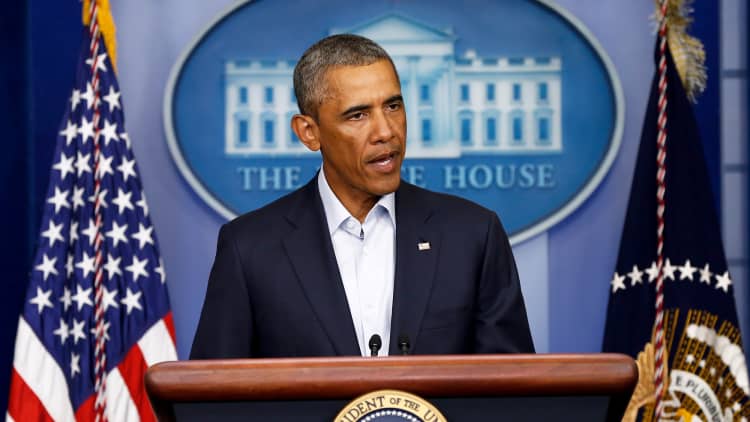Foreign policy successes have been rare for the current White House so it was surprising this week to see President Barack Obama take something of a victory lap over the apparent success of efforts to beat back Islamic radical advances in Iraq.
But it certainly made sense for the president to take satisfaction where he could because beyond that small victory, Obama's presidency seems disconnected and directionless.
Obama made his remarks on Iraq during a brief break from his Martha's Vineyard vacation. But instead of looking rested, the president appeared fatigued and frustrated, particularly over the continued clashes between police and demonstrators in Ferguson, Missouri, site of the police killing of unarmed black teenager Michael Brown.
Obama has now spoken twice on Ferguson and both times evinced little emotion over either the fact of the shooting or the deeply distressing nightly scene of police firing tear gas at demonstrators, some of whom are now returning fire with rocks and Molotov cocktails while others take the opportunity to loot businesses.
Read More
There is a rationale to Obama's very low-key demeanor on Ferguson, as Vox's Ezra Klein lays out: The president tends to make polarization even worse when he weighs in heavily on such highly charged racial issues. But to critics of the president's approach—and there are many in both parties—the Ferguson crisis cries out for stronger presidential leadership, no matter the failures of the past.

Obama seemed miffed that Missouri Gov. Jay Nixon called out the National Guard but did not appear inclined to try to do anything about it. He softly called for police restraint and chided the small number of violent bad actors in the crowds.
But there was no real sense that this was the leader of the nation with a plan to end the crisis and heal the very raw wounds in Ferguson.
Obama, who ran in 2008 as a healer, has apparently given up on even trying. The argument that Obama could make things worse by going to Ferguson and drawing away local resources may be true. And it also may be true that there is no magic set of words Obama could utter that would help wind down the frightening scenes in Ferguson.
Read MoreObama: 'Major step forward' in Iraq
But that doesn't mean the president couldn't at least speak more boldly, demanding more clearly a full, public accounting of how and why Brown was shot six times, coupled with a full-throated condemnation of those who would take violent action against police and innocent members of the Ferguson community.
Obama's approval ratings are already in the cellar, and much of the nation has soured on his abilities as a transformational leader. So why not at least take a shot to turn that around? Ferguson surely looks like the opportunity to do that.
Instead, Obama seemed content to send Attorney General Eric Holder to the scene while he went back on vacation. Hard to imagine the previous Democratic president taking this kind of approach.
And matters on Capitol Hill, where the president is considering major unilateral action on immigration and corporate tax inversions, appear even worse. Congressional Democrats are now very openly saying they have basically no relationship with the presidentand have no expectation that this will change over his final two years in the White House.
The on the record quotes in The New York Times story on this topic are stunning. Sen. Claire McCaskill, D-Mo., told The Times that for Obama, "eating his spinach is schmoozing with elected officials. This is not something he loves."
Sen. Joe Manchin III, D-W.Va., told The Times: "Maybe if something isn't working, you'd say, 'What can I do better? … Maybe we wanted something different. But it kind of is what it is."
"It is what it is" is apparently the 2014 version of "hope and change."
How does Obama plan to rally support for his unilateral action efforts if even Hill Democrats openly disdain him? And is it any wonder that Obama is casting about for administrative remedies to corporate tax relocations instead of basking in the economic glow of a successful broad tax reform that would make the U.S. code competitive and eliminate the reason for inversions in the first place?
And instead of worrying again about continuing resolutions and government shutdowns this fall, could we be in the early years of a long-term deal to reduce structural debt while investing in infrastructure in the near term?
None of these failures are Obama's alone.
Congressional Republicans indeed blocked him at many turns and appeared to walk away from a big debt reduction deal that many progressive Democrats also did not like.
But great transformational leaders, as Obama hoped to be, don't complain about obstructionism or shy away from taking on tough, emotionally charged issues. They shape their political world rather than bend and give in to it.
One senior Democrat with close ties to Hill leadership told me that "except for fundraising, it appears … POTUS has completely checked out." With over two years left on the clock, it's not too late to check back in and turn things around.
—By Ben White. White is Politico's chief economic correspondent and a CNBC contributor. He also authors the daily tip sheet Politico Morning Money [politico.com/morningmoney]. Follow him on Twitter @morningmoneyben.


